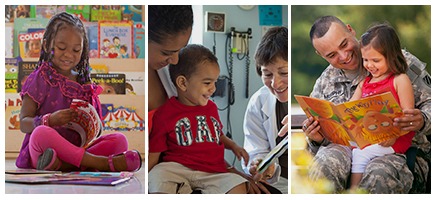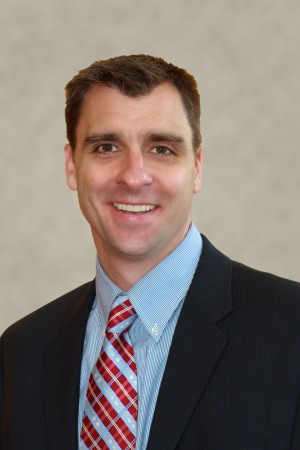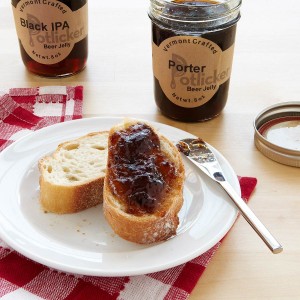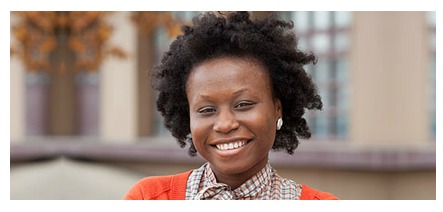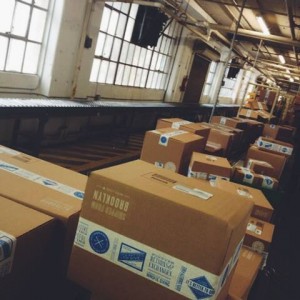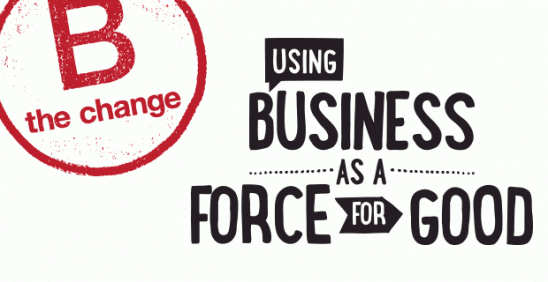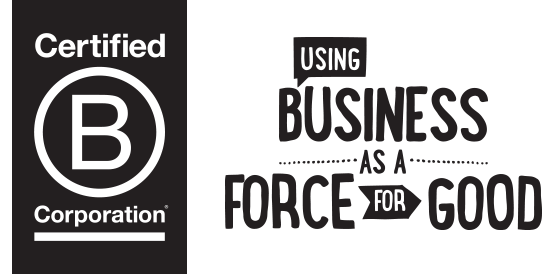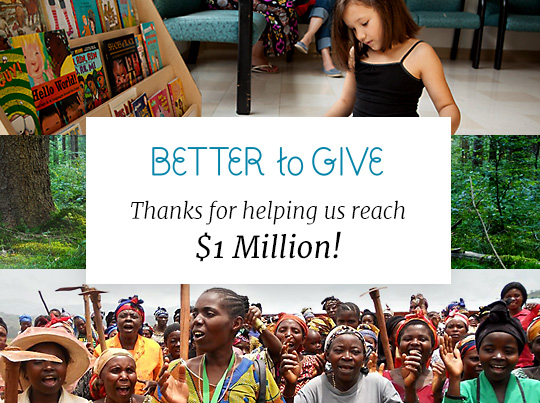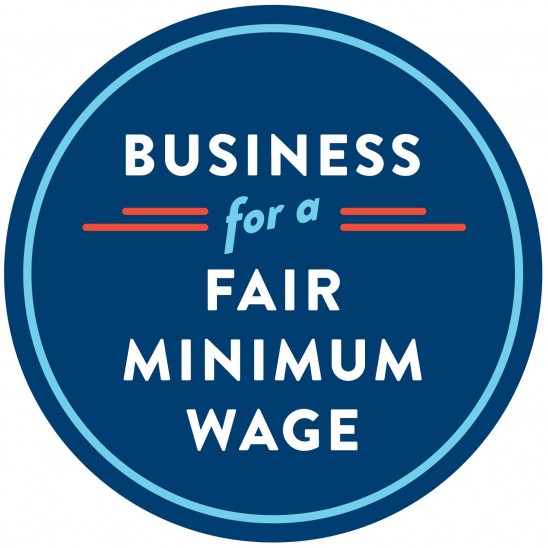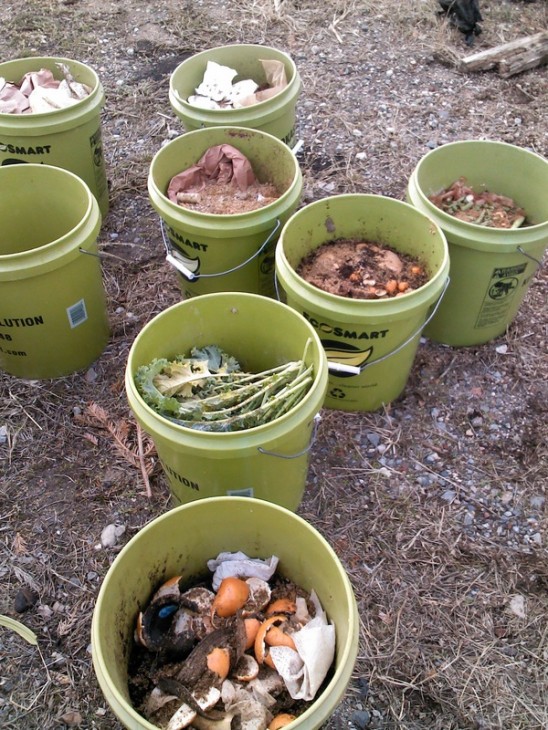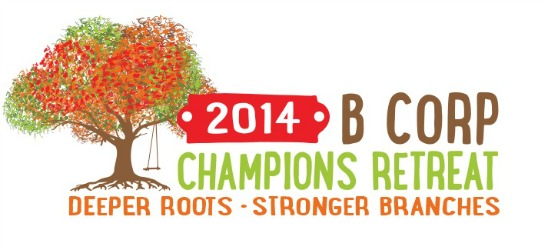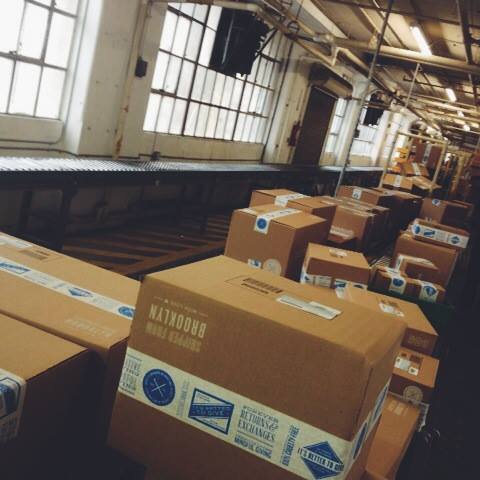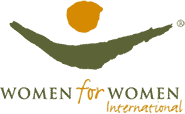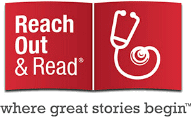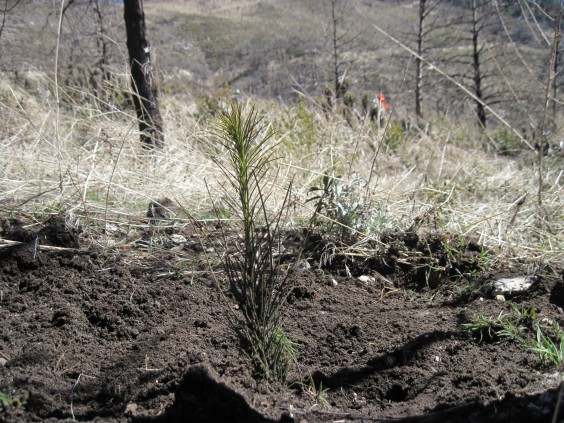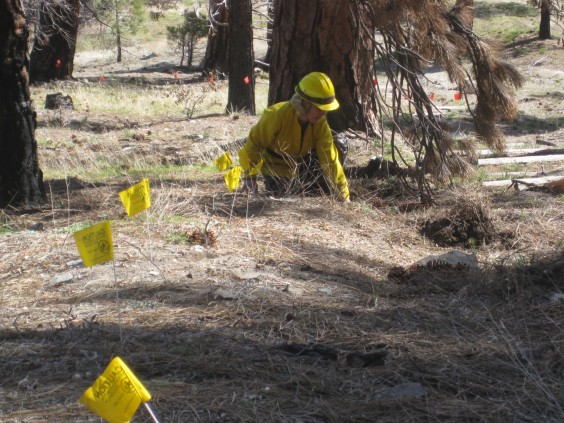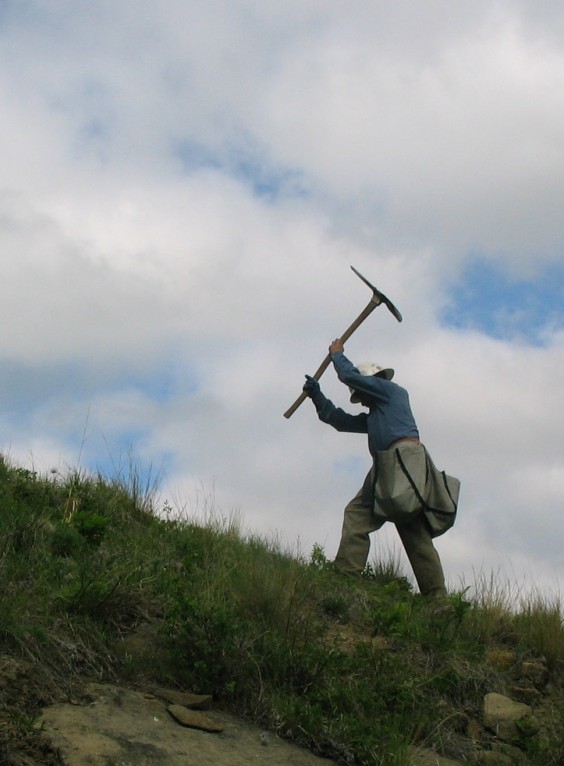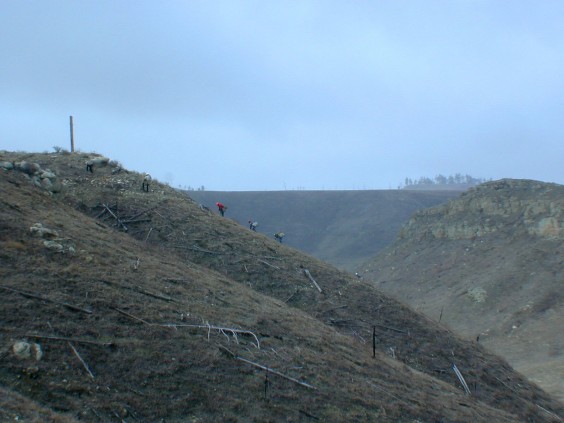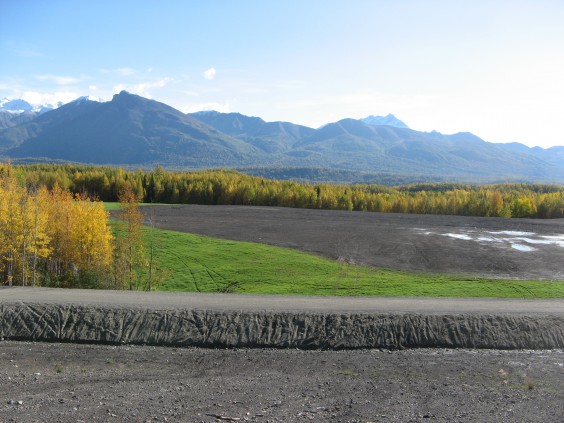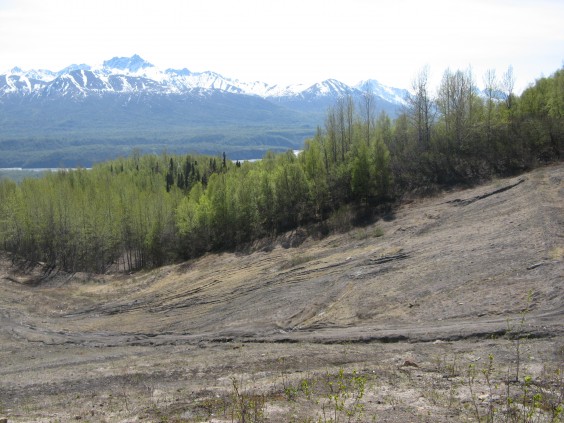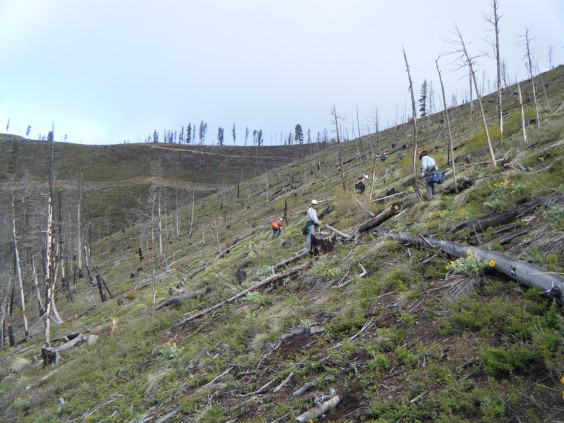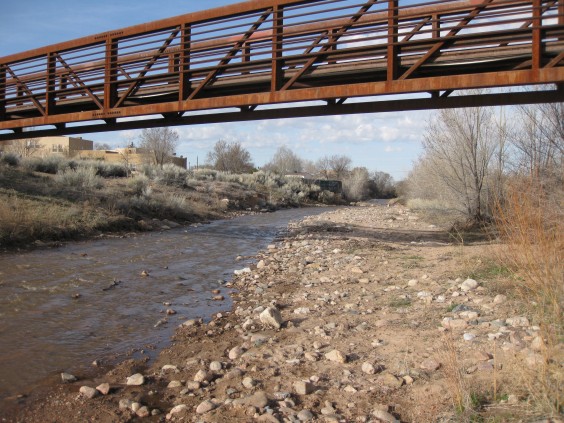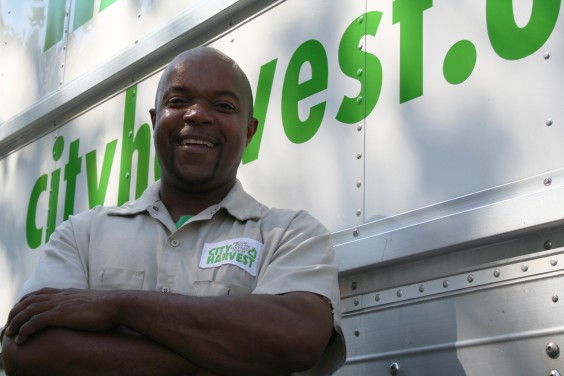American Forests is the oldest nonprofit conservation organization in the United States. Watch this short video message to learn more about how we’re helping them restore trees in an area that’s home to at least 150 pairs of bald eagles and more than 250 other wildlife species through our Better to Give program.
In 1999, UncommonGoods was founded as an alternative retailer driven by an emerging market for unique, handmade and environmentally friendly designs, as well as a conviction that business could be a force for good in the world. And over the past fifteen years, the people behind our efforts—our Brooklyn team, not-for-profit partners, and an array of independent artists and independently minded customers—have been the inspiration and can-do catalysts of our growing business. So, as we look back at 2014, we thought the best way to characterize the year is by profiling a few of the people and partners that made it one to celebrate.
Reach Out and Read: a Better to Give Success Story
Through our Better to Give program, UncommonGoods has donated over $1 million to our partner non-profits.
As an independently owned business, we have the freedom to support causes we believe in, helping them to impact the world in a positive way. Through our Better to Give program, we make it easy for you to join us in supporting these great causes—with every purchase you make, we’re proud to donate $1 to your choice of one of our non-profit partners. Over the week of Thanksgiving, we increased the Better to Give donation to $5 for those visiting our site through a special email campaign, taking us past the $1 million donation mark on Black Friday!
Our newest Better to Give partner, Reach Out and Read, joined us in 2014, and was immediately a popular choice, gaining over 35 thousand customer backers, for a total of more than $35,000 in donations. Reach Out and Read serves more than 4 million children annually, sharing the transformative power of reading with families in need nationwide. As recommended by the American Academy of Pediatrics, the program incorporates early literacy into pediatric practice, equipping parents with tools and knowledge to ensure that their children are prepared to learn when they start school.
With obvious passion for his organization’s work, Reach Out and Read’s Executive Director Brian Gallagher shared some of the ways that Better to Give has benefited their efforts over the past year:
“The support has allowed us to purchase brand-new books (our favorites include Goodnight Moon and Clifford the Big Red Dog) and to deliver critical literacy guidance to families in need. With the support of UncommonGoods and others, we have been able to grow our program in 2014, adding our unique early literacy intervention in 287 additional health centers, hospitals, and pediatric clinics nationwide, serving 230,000 more children. UncommonGoods has provided essential funding to keep our program expanding—truly helping us to change pediatrics, change families, and most importantly, change futures.”
Brian also commented on some of the benefits of our collaboration beyond the bottom line:
“In addition to the amazing financial support, the Better to Give partnership has helped educate an entirely new audience about Reach Out and Read—and the importance of early literacy and early intervention. We have seen our social media base steadily increase over the year, and feel certain that many of those fans and followers are UncommonGoods customers. We have also been able to reach shoppers who have a social conscience, and may have chosen to support Reach Out and Read additionally outside of the Better to Give partnership. We are so grateful to have had the chance to align ourselves with such a great brand, and use this platform to help us raise funds and overall awareness of our organization and our mission.”
Finally, he sees some important affinities between UncommonGoods and Reach Out and Read that make this partnership a great fit:
“We love that UncommonGoods is more than just a company—you give back to those in need and you strive to better the world, as we do through our literacy intervention. And based on the amount of support we’ve received this year, your customers are clearly people who also care about literacy and value the early interactions between a parent and a child. We are beyond thrilled with this relationship and look forward to all that is to come as our two organizations continue to work together to effect positive change.”
Nancy and Walter Warner: a Bigger Jam Session
UncommonGoods promotes the work of more than 600 small, independent makers; 80% of these have 10 people or fewer on their team.
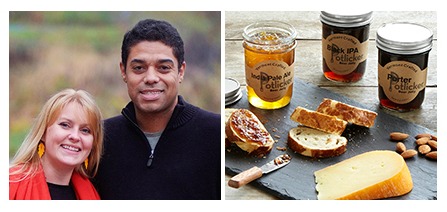 Nancy and Walter Warner, Beer Jelly Set
Nancy and Walter Warner, Beer Jelly Set
Part of UncommonGoods’ long-standing mission is to support the work of innovative, independent makers—artists, designers, craftspeople, and…jelly makers. Each of the 600 makers that we represent has a unique story, and Nancy and Walter Warner are no exception. The two former archaeologists moved to Vermont to pursue new ventures: Walt pursuing a career as a cultural resource lawyer, and Nancy launching a business making distinctive, artisanal preserves. Their collaboration with UncommonGoods has allowed them to take their craft from cottage industry to a full-steam operation.
Nancy Warner put her spoon down long enough to reflect on the effect of their partnership with UncommonGoods over the past year:
“Working with UG has allowed us to grow our business with confidence in 2014. The partnership and the audience UG reaches has helped us more than double our gross sales from the previous year. We thought we were full time before our partnership with UncommonGoods, but teaming up has helped us become job creators: we’ve hired four employees, invested in new equipment, and have quickly outgrown our tiny spot on the town green and are on the hunt for our next home in Vermont.”
She also commented on the esprit de corps between her venture and the UncommonGoods team:
“I believe we are a great fit with UncommonGoods because the staff there is as excited about our work as we are. True believers in the creative and uncommon process, UncommonGoods has worked with us to develop new flavors like Cabernet & Cracked Pepper wine jelly, conferenced with us regularly to be sure we’re on the same page, and supported our use of environmentally-friendly packaging (even though it may cost just a bit more). Most importantly, the UG crew reaches out to us regularly to be sure they understand our process and our limits as small producers of handcrafted items. In some ways, UG feels like an extension of our own team.”
Kenesha Phillip on the People Who Drive the Success of UncommonGoods
UncommonGoods is committed to paying a living wage, with hourly team members paid 70% higher than the Federal minimum.
Kenesha Phillip, UncommonGoods Area Operations Manager
UncommonGoods maintains a team of 120 year-round—and 685 seasonal team members in the fourth quarter (2014)—all under one roof in the historic Brooklyn Army Terminal in Sunset Park, Brooklyn. Keeping all operations in New York and in a common space has been a priority since the company’s founding. And maintaining a great team by paying a living wage, providing opportunities to grow with the company, and valuing the potential of each individual have been essential elements in UncommonGoods’ success over the past 15 years.
Despite the frenetic pace of our warehouse in December, Area Operations Manager Kenesha Phillip—who herself started as a seasonal Team Lead in 2012—took some time to reflect on the character of UncommonGoods’ team:
“I think that the recognition of humanity is a really important thing. In the world that we live in now…it’s important that people know that you see them, and that they know they’re valuable, and that’s the most important thing that UncommonGoods does. Tom or Dave [company founders] will walk into the warehouse and say that the people closest to the customer are the most important people to the business, and that’s very nice to hear and very comforting and makes people feel appreciated. If there’s one thing I’ve learned from being on the warehouse floor, it’s that people give their best effort when they feel like you see them and you value them…they feel like they’re here to help the team accomplish a bigger goal.”
Brooklyn Army Terminal
She also commented on the challenges and opportunities that come with the company’s seasonal activity which calls for a high quality team:
“The human element here is really important, and something that we fight for all the time. And it’s not an easy thing to do—the bar is raised year after year, and we need better and better people to work for us. But it’s definitely an attraction when you know you can start as a seasonal worker and move into a management role. It helps us hire a strong team and keep a strong team here. I’d worked in retail before, so I know how people are typically paid in retail and what kind of environments they are…[here] it’s just different…we pay people a living wage, and we try to treat people with respect. If you walk over to the warehouse right now, you can’t tell who’s year-round and who’s seasonal. We try to make sure that everyone has a great experience, regardless of whether they’ve been here for a few months or for years. We work together as a team.”
Regarding UncommonGoods’ commitment to keeping the entire company under one roof in Brooklyn, she observed:
“For us to be successful as a company, Operations has to go well, but everything else in the company has to go well too. We partner with so many departments every year to make sure that the customer has a good experience in the holiday season. We work with the Merchants…with Customer Service…with Human Resources…to make sure that those things all come down to the customer. So it’s a nice thing having the corporate offices in the same building as the warehouse.”
And she discussed the importance of paying a living wage for a company—and team—that calls New York home:
“It’s very expensive to live here, so people need the wages that we pay…and people always ask about it when they return because we do pay such a good wage compared to the Federal level. I know that it impacts the lives of the people that work for us in a significant way, even if it’s for a short time. It’s a significant thing, and it means someone being able to pay their rent. It makes all the difference in people’s living conditions. I know that some people that work for us have a difficult time financially, so it’s important that we continue to do this, and it’s something to be proud of.”
Always Becoming a Better Business
As a founding B Corp, we’re committed to sustainability. This year we made strides with our highest B Lab score yet.
We’ve always been passionate about sustainability, and back in 2007 we joined our fellow founding B Corporations in starting a global movement to redefine success in business. As the official B Corp website explains, by earning our certification we’re “voluntarily meeting higher standards of transparency, accountability, and performance, Certified B Corps are distinguishing themselves in a cluttered marketplace by offering a positive vision of a better way to do business.”
In 2014 we showed that we’re still going strong when it comes to sustainability. In fact, we proudly announced that our Impact Assessment came back with our best score so far: 111.4 points. (That’s 12% higher than our previous score.)
Many of the improvements we made in 2014 helped us earn our recertification and earn a higher score than we’d had in the past. We formed a sustainability committee to give employees opportunities to personally impact our sustainability decisions, we implemented composting and better recycling programs, and we improved our vendor relationships.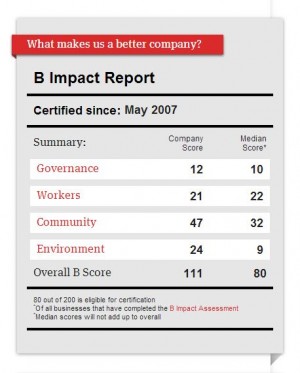
While we are definitely happy with the changes we’ve made and our improved score, we know that working to be a better business is an ongoing process. After our recertification was complete, we sent a representative from our sustainability committee to join other representatives from businesses in the B Corp community at the B Corp Champions Retreat to bring back advice on how we can continue to grow as a socially responsible company and make a positive impact on the world.
We’re excited to continue to make positive changes in 2015, to grow and nurture our talented team, and to keep building strong relationships with our Better to Give partners, makers and artists, and customer community. Happy New Year!
During the chaos, magic, excitement, and deliciousness of the holidays, it can be difficult to take the time to pause and reflect on the past year. The end of the year always seems to sneak up like a Secret Santa gift, something that you almost forget about until it pops up on your desk unannounced. Now that the end of 2014 is less than two weeks away, there’s no better time to think back about what we’ve accomplished over the past 12 months and how we want to move forward in 2015, especially when it comes to our sustainability efforts. Each year teaches us that positive change is the result of decisions that factor our “triple bottom line,” our impact on people, planet, and profit. We’re proud of the milestones we’ve achieved in 2014, as well as the initiatives that continue to support our company mission. Here’s this year’s impact in review!
B Corp Recertification
In 2007 we took an important step when we became a founding B Corporation, a certification that has since expanded to a network of companies that use the power of business to help solve environmental and social problems. Earlier this year, we made another stride toward becoming a better business by earning our B Corp recertification, coming out with our best score yet! We earned 111.4 points this time around, which equated to a 13 percent increase over our 2012 score of 99 points. While some of the extra points were thanks to improvements to our work environment and green initiatives, we saw the greatest improvement in our “Community” score. Check out the full story!
Better to Give: Thanks a Million!
We launched the Better to Give program in 2001, which allows customers to select from one of our non-profit partners to receive a $1 donation from us at checkout. Over the week of Thanksgiving, we raised that donation to $5 for those visiting our site through a special email campaign. We saw the donation rate skyrocket during this time, taking us past the $1 million mark on Black Friday! Check out the announcement to learn how we’ve now donated over $1 million to our Better to Give partners.
#RaisetheWage
At UncommonGoods, we pay all our workers, including our seasonal team, above the minimum hourly wage. Back in September, our Founder and CEO Dave Bolotsky participated in the #RaisetheWage campaign with Business for a Fair Minimum Wage. To show your support, spread the message by sharing this video with the hashtag #RaisetheWage and help “give America a raise!”
Composting
Earlier this year, we teamed up with Vokashi Kitchen Waste Solutions to start implementing an in-house compost collection. Collection buckets are strategically placed around our headquarters to collect employee food scraps, which are used to compost at various community gardens and public green spaces. We’re excited to continue improving our waste management during 2015!
The B Corp “Ripple” Effect
Sustainability committee member Christopher McRae and CEO and founder Dave Bolotsky traveled to Vermont to attend this year’s B Corp Champions Retreat. Check out Chris’ experience from three inspiring days of learning from other B Corps, celebrating the movement, and discussing future goals.
Product and Operations
From operations to product development, our team works hard to implement sustainable solutions whenever possible. We try our best to minimize our impact by shifting more business online, limiting how many catalogs we mail, and printing our catalogs on either recycled paper (virtually all of which is from 30% post-consumer waste) or paper sourced from FSC certified forests (which are harvested in a sustainable manner). Around 20 percent of our products are made from upcycled or recycled materials, and about 50 percent are handmade, none of which contain leather, feathers or fur. Additionally, we continue to save resources by using packing materials that can be inflated in our warehouse, and bale recyclable cardboard to return to our vendor, making for a closed-loop system. Throughout 2015, we plan to continue working on energy efficiency, sustainable sourcing, and sustainable product development.
We welcome you to send any questions, comments, concerns, or ideas to sustainability@uncommongoods.com. As always, thank you for supporting our mission. From all of us at UncommonGoods, we wish you and your loved ones a happy holiday season and a happy new year!
We’re proud to announce that we’ve now donated over $1 million to our Better to Give partners, thanks to the support of our amazing customers. All year long, we give customers the opportunity to select a non-profit organization with every order placed. When a partner is chosen, we then donate $1 on the customer’s behalf. Over the week of Thanksgiving, we raised that donation to $5 for those visiting our site through a special email campaign. We saw the donation rate skyrocket during this time, taking us past the $1 million mark on Black Friday.
It fills all of us with pride to think about the impact we’ve been able to make with these donations, especially as a mid-size business operating out of one warehouse in Brooklyn. One of the fundamental reasons that our founder Dave Bolotsky started this company was to prove that capitalism could be a force for positive change in the world, and passing this $1 million milestone serves as validation of that concept. We know, however, that none of this would have been possible without a community of talented artists supplying us with appealing products, non-profit organizations dedicated to furthering meaningful causes, and wonderful customers who are receptive to what we are trying to do.
We’ll continue to donate a dollar to a Better to Give partner each time you order, so don’t forget to choose one of these non-profit partners next time you’re shopping with UncommonGoods.
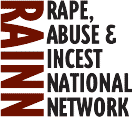 RAINN, the nation’s largest anti-sexual violence organization, carries out programs to prevent sexual violence. RAINN created and operates the National Sexual Assault Hotline and partners with more than 1,100 rape crisis centers across the country. They also provide resources for policymakers and the media, build community partnerships to promote nationwide education, and work to ensure that rapists are brought to justice.
RAINN, the nation’s largest anti-sexual violence organization, carries out programs to prevent sexual violence. RAINN created and operates the National Sexual Assault Hotline and partners with more than 1,100 rape crisis centers across the country. They also provide resources for policymakers and the media, build community partnerships to promote nationwide education, and work to ensure that rapists are brought to justice.
To date, 147,415 customers have chosen to donate to RAINN.
American Forests is the oldest non-profit conservation organization in the United States. Their mission is to protect and restore forests worldwide. Since 1990, they’ve planted more than 45 million trees–helping to preserve the health of our planet for the benefit of its inhabitants.
To date, 192,037 customers have chosen to donate to American Forests.
Women for Women International helps women survivors of war by providing them with the tools and resources they need to move from crisis and poverty to stability and self-sufficiency. By bringing women together in a safe space to teach life, business, and vocational skills, Women for Women International helps them become independent. This creates a ripple effect that not only benefits the women enrolled in these programs, but also builds stronger families and communities.
To date, 111,972 customers have chosen to donate to Women for Women International.
Reach Out and Read’s thousands of doctors and nurses promote early literacy, language skills, and school readiness to young children and their families in all 50 states. By integrating children’s books into well-child visits and encouraging parents to read to their children, Reach Out and Read lays a foundation that puts children on an early path to educational success.
Reach Out and Read is our newest partner. We’re thrilled that 18,304 customers have already shown their support for this organization through Better to Give!
We’ve worked with many other organizations over the years, so we’d also like to take a moment to thank everyone who donated to our past partners. Whether through a years-long partnership or a more short-term campaign focused on a particular crisis, we’re proud to support the work of each and every one of these amazing non-profits.
Next Generation Nepal – 2,069 Givers
Defenders of Wildlife – 92,496 Givers
World Wildlife Fund – 41,517 Givers
Craft Emergency Relief Fund – 47,572 Givers
Comprehensive Development Institute – 71,805 Givers
Tranquility Trail Animal Sanctuary – 1,051 Givers
AmeriCares -169, 281 Givers
City Harvest – 95,427 Givers
B Corporation – 425 Givers
HarlemLIVE – 8,496 Givers
Save Darfur – 727 Givers
Thanks again for helping us reach this $1 million milestone. We’re looking forward to celebrating the next $1 million with you soon!
B Corp Status Renewed: The Mission to be a Responsible and Sustainable Business
August 8, 2012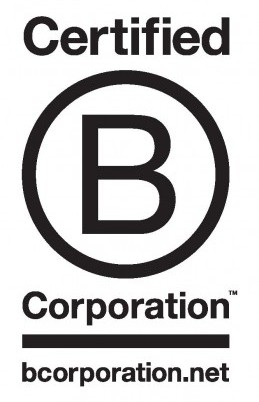
When you think UncommonGoods you probably think unique, creatively designed and, well, uncommon products. Perhaps UncommonGoods is even your go-to place for gifts for those hard-to-buy-for family and friends and maybe even the place to gift yourself (don’t we all do that occasionally).
What you may not know is that UncommonGoods is voluntarily meeting higher standards of social and environmental performance through the B Corporation certification. The B Impact Assessment, conducted by the non-profit organization B Lab, aims to look beyond the marketing efforts of a company to assess the true impact of a business on their workers, community, and the environment.
Earlier this year, I led the effort to recertify UncommonGoods as a B Corporation, working with cross-departmental team members to assess how we’re doing. A founding member of B Corp, we’ve now reached our third term and our score of 91.3 shows that we are committed to upholding a higher standard when it comes to our stakeholders, including the environment, our employees, and the community.

Our founder David Bolotsky has been making a continuous and strong effort in running a sustainable business ever since the company was founded in 1999. We are passionate about changing the way business is conducted by making sustainability a part of every decision we make. An important focus is to have a positive impact, not only in our own work place but in the world at large. For example, some benefits available to employees are that 80% of health insurance premiums are paid by UG (50% for families), whenever feasible alternate work schedules like part-time, flex-time or telecommuting are an option, there is a health and wellness program in place, including offering fresh organic fruit in the break rooms and incentives are given to encourage low-impact commutes to and from work.
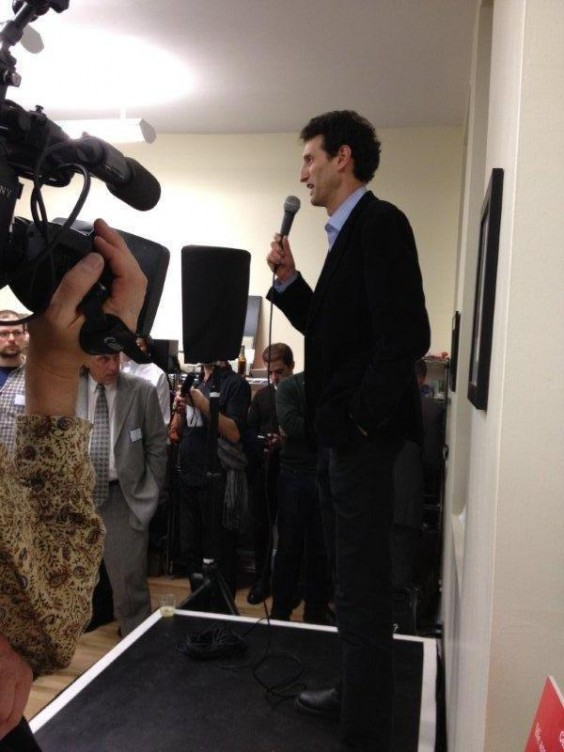
A positive impact also means offering our customers creative and exciting merchandise that is built to last and made without harm to humans and animals; giving talented artists and designers a platform to sell their unique and often handmade product on a larger scale; making truthful and substantiated claims around all our products and avoiding the pitfalls of green-washing; and making smart packaging decisions when we ship the goods out to our customers and their friends and families.
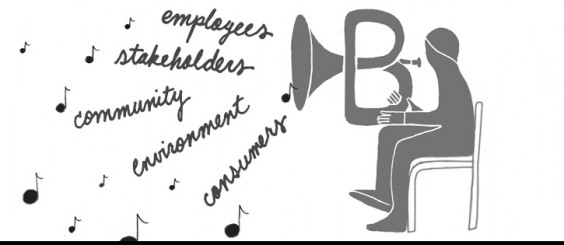
While not always an option in every product category, we prefer to work with local, sustainable, and fair trade suppliers. As a matter of fact, 14% of sales last year was generated with local and independent suppliers alone, ‘local’ meaning suppliers within a 200 mile radius. About half of our sales came from items made in the US, a little over a third from handmade products and about a fifth from products made of recycled content.

Being an internet and catalog retailer, we understand that producing a catalog uses the earth’s resources. Our goal is to minimize that impact by shifting more business online, limiting how many catalogs we mail, and continuing to print our catalogs on either recycled paper or paper sourced from FSC certified forests.
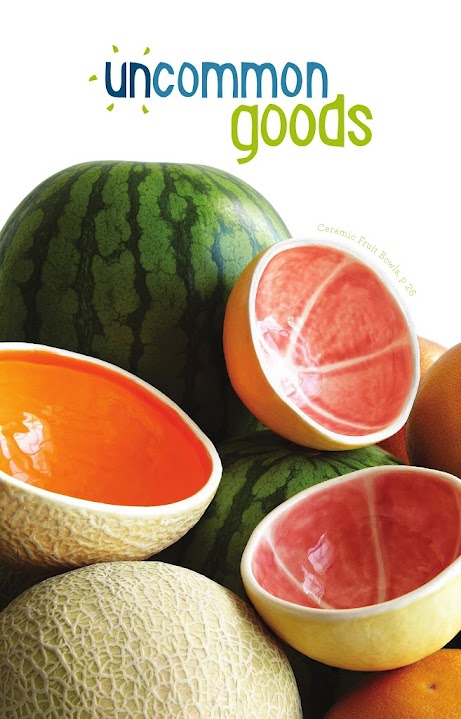
We love to give back to the environment and the community whenever we can. In 2011, we helped plant hundreds of trees (1,400 to be exact!) in Marine Bay Park as part of the MillionTreesNYC initiative. After over a year of tenacious persuasion tactics we also convinced city officials to make the landscape more appealing by planting street trees around Brooklyn Army Terminal (our offices) and we are volunteering our time and resources to help keep them in good health. I’m happy to report that so far they look quite happy!
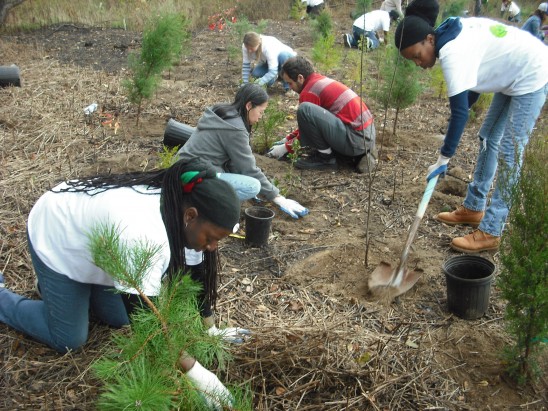
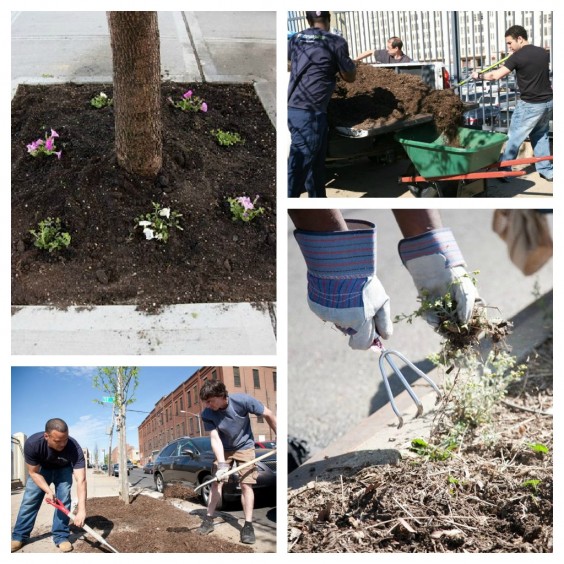
Through the Better To Give program, UncommonGoods supports the mission of local and national non-profits. The Better To Give program gives our customers the opportunity to have UncommonGoods contribute to a non-profit organization each time they shop with us. Also, a portion of the sales of our Plates with Purpose, the Be The Change Paperweight and the Pelican and Sandpiper Nightlights is donated to non-profit partners – each item listing tells our customers exactly how much is donated and which organization it’s donated to. Last year we donated about $120K through our Better To Give program as well as $75K in product donations!
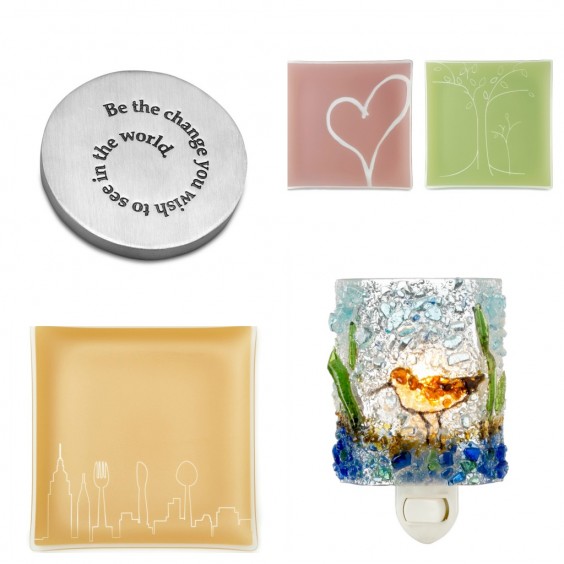
On an ongoing basis, employees from all areas of our company are given the opportunity to discuss how we can make UncommonGoods more environmentally friendly, socially responsible and an ever-more rewarding place to work. Our four company goals serve as our guiding principles to be a responsible company; these goals are to be a great place to work, to be our customer’s favorite place to shop, to have a positive impact on the outside world, and to produce strong financial results.
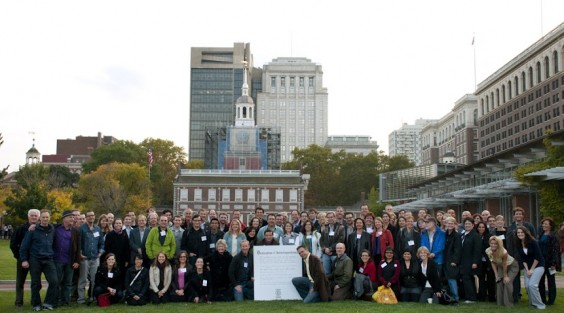
The great thing about the B Corp seal is that it certifies the company as a whole, not just an individual aspect. It gives a customer insight on how a company is doing overall, from providing a living wage, to employee wellness, to lessening the environmental impact, to giving back to the community.
Fellow B Corp BBMG conducted a study on why B Corps matter and found that 73% of consumers care about the company, not just the product, when making a purchasing decision. Another interesting finding is that less than 1% of consumers actually trust company advertisements or statements when assessing a product or company. The more consumers know about the concept behind the B Corp certification/Benefit Corporation, the more consumer-spending will be influenced by this knowledge.
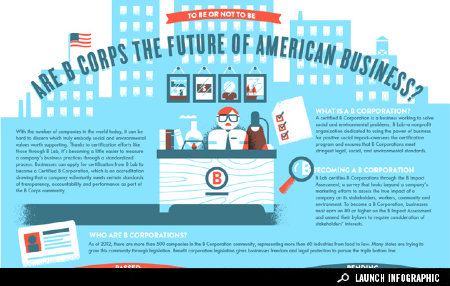
The bi-annual assessment and re-certification process is an excellent way to share our achievements with our customers and team members. More important, it helps us to set benchmarks for the social and environmental impacts of UncommonGoods and identify opportunities for future improvement.
We strive to be a driver of positive change and are convinced that collaborating with fellow B Corps and other industry leaders will have a positive impact. The certified B Corp community is made up of over 550 companies from 60 different industries and represents about $3.1 billion in revenues. It’s a large community of value-driven companies wanting to make a positive impact that are open to sharing advice and insights.
The holy grail of 100% sustainability is no small task to achieve – after all, the most sustainable product is the one that was never made – but we are very dedicated to making responsible, thought-through and well-informed decisions in everyday operations and to leading our business with integrity.
I asked our friends at American Forest last month what they’d been able to do with our Better to Give donations over the past year. Turns out they’ve planted more than 59,000 trees across the US. Isn’t that incredible? And it’s all because of you. Each time you pick American Forests at checkout, we donate $1 to their tree-planting programs. Thanks for your loyal support!
Since 2010, UncommonGoods has helped support the planting of more than 59,000 trees through American Forests’ Global ReLeaf® program. This partnership has planted trees in critically important locations that span across 6 states and 9 separate ecosystem restoration projects. American Forests is proud to have planted the following trees on behalf of UncommonGoods and all of their respective customers and employees.
Name: Spotted Owl Habitat Restoration in Angeles National Forest– 210 Trees
State: CA
American Forests is partnering with the USDA Forest Service to replant areas of Angeles National Forest that have been damaged by wildfires. It will take three years to replant all of the damaged areas. In 2011 project work will include growing seedlings, preparing the site, and planting and monitoring. This project will work to restore the critical habitat for the California Spotted Owl (Strix occidentalis) and other threatened, endangered, or sensitive plant and animal species. The Spotted Owl’s primary habitat is forest areas that include Douglas fir.
The wildfires destroyed 10% of that habitat within Angeles National Forest. This project will also protect the local ecosystem. The site is part of the watershed at the headwaters of Los Angeles River. Soil erosion has negative effects on aquatic species in the Los Angeles River so the newly planted trees will prevent soil in and around the planting site from eroding into the river. The planting will also help prevent future wildfires by restoring the site with native tree species before the land can be taken over by non-native grasses.
Name: Poe Cabin Fire Restoration – 22,691 Trees
State: ID
American Forests is teaming up with the USDA Forest Service to replant areas of the Nez Perce National Forest that were damaged by wildfires. Planting trees at this site offers numerous benefits, including a decrease in soil erosion which will lessen the amount of sedimentation being deposited into the area’s water sources. This in turn will help to protect anadromous, fish that live mostly in the ocean but breed in fresh water, fisheries located along the Snake River. Deer and wild turkeys will also benefit from this project. Reforesting the area will provide these species with places to hide and keep warm during the winter months. Part of the reforestation project encompasses the Pittsburg Landing Road, which allows access to the Snake River. The river provides a host of recreational activities and is a popular tourist location. This project will plant tree species, including the severely threatened whitebark pine, a species found in the western US and Canada that is threatened by wildfires, mountain bark beetles, and blister rust. American Forests is sponsoring various projects to reforest white bark pine this year.
Name: Kraft Springs Fire Rehabilitation – 8,470 Trees
State: MT
American Forests is partnering with the USDA Forest Service to reforest areas within the Custer National Forest. This area has been damaged by multiple wildfires, occurring in 1998 and 2002. The area continues to see an increase in wildfires due in part to a changing climate which has created warmer and dryer conditions. These conditions have allowed wildfires to burn with previously uncharacteristic severity. As a result of the wildfires, forested habitat has been reduced by 69 percent. Reforesting this area with ponderosa pine will increase habitat and food supply for elk, mule deer, whitetail deer, and goshawk.
Name: The Chiginagak Volcano Valley, Alaska Native Tree Restoration Project — 6,613 Trees
State: AK
The Chiginagak Volcano Valley in the Alaskan Peninsula was damaged by a lahar flow that greatly decreased the wildlife population and destroyed much of the foliage. The lahar flow also reached creeks, contaminating them with sulfuric acid. The purpose of this project is to restore the native habitat and protect the water by replanting 350,000 trees.
The trees to be planted are Alders, Poplars, Willows, and dwarf conifers to ensure native species diversity. This project also benefits the area economically. The rivers and streams damaged by the lahar flow feed into Bristol Bay, which supports a large fishing industry. Repairing the ecosystem will bring back fish into these streams and ultimately into Bristol Bay.
Name: Showerbath Wildfire Reforestation — 2,000 Trees
State: ID
Approximately half of the planting site was harvested in the early 1970s and unsuccessfully replanted with Douglas-fir Seedlings. The mortality of that planting was very high because of the harsh conditions created when most of the overstory was harvested. This project will plant 63,000 Douglas-fir and Lodgepole pines over 210 acres to continue to protect many species of wildlife, improve watershed conditions, and to keep the Salmon-Challis National Forest enjoyable for recreational use.
Name: 2010 Kirtland’s Warbler Habitat Creation — 5,500 Trees
State: MI
This reforestation project in the Huron Manistee National Forest is designed to plant 402,000 trees over 369 acres with the state of Michigan and the US Forest Service in order to provide habitat restoration for the Kirtland’s Warbler. The Kirtland’s Warbler is an endangered species song bird which requires both the particular Jack Pine specie to nest in and scattered openings of land to fulfill their habitat needs. The trees themselves must be in the range of 4-15 years old for the Kirtland’s Warbler to nest in, making the effect of this project not fully seen until down the road. These specific conditions that the Kirtland’s Warbler requires will be put in place to combat the ever increasing encroachment of human inhabitation on the bird’s habitat. The trees for this project will be planted in the spring of 2010 by local contractors.
Name: Cave Gulch & Maudlow-Toston Fire Rehabilitation — 7,500 Trees
State: MT
This project will reforest an area of the Helena National Forest that was burned in the 2000 Cave Gulch and Mauldow-Toston fires. Roughly 40,000 acres of National Forest Lands’ were burned by these fires located in the Big Belt Mountains. Over 400 acres of this land will be planted on with 130,000 Douglas-fir and Lodgepole pines. This project hopes to improve the local watersheds, which contain critical fish-bearing streams that are also important to the other wildlife in the ecosystem that count on these fish for food.
Name: WildEarth Guardians 2010 New Mexico Riparian Restoration — 200 Trees
State: NM
WildEarth Guardians aims to plant over 65,000 native shrubs and trees across four distinct watershed located in total throughout the state of New Mexico. These four project areas are located along the Santa Fe River, Bluewater Creek, La Jencia Creek, and the Rio Puerco. All of these watercourses have seen intense historic disturbance regimes, including domestic and wild ungulate overgrazing and browsing, destabilized stream channels and banks, non-native shrub and tree establishment, extreme temperature loading and fluctuations, and impacts of off-highway vehicles. These impacts have resulted in degraded stream and riparian area functionality. The goal of this project is to restore function to the area by undertaking a variety of proven restoration measures, including non-native species removal, stream channel and bank stabilization, native species reforestation, domestic and wild ungulate control, and prohibiting off-highway vehicle access.
Name: Lower Rio Grande National Wildlife Refuge — 5,859 Trees
State: TX
American Forests continued the partnership with the Lower Rio Grande National Wildlife Refuge for the 14th consecutive year by supporting the on-going reforestation of the Lower Rio Grande Valley. This area is one of the most biologically diverse regions in all of North America and is also one of the poorest, though fastest growing, regions in the United States. The reforestation of this corridor benefits the unique wildlife of this subtropical region, including endangered species such as the ocelot and jaguarondi. More than 490 species of birds and about 40 percent of all North American butterfly species (300+ species) live in this four-county project area. This project helped maintain a bountiful and biologically diverse land as a key component to the area’s ecotourism industry.
We’ve been supporting City Harvest – the world’s first and New York City’s only food rescue organization – since 2011 and we’re happy to report that your Better to Give votes have been put to great use! The response over the last six months has been amazing and collectively, we’ve donated nearly $25,000 through our Plates with Purpose and Better to Give programs. It only costs City Harvest 27 cents to rescue and deliver one pound of food, so these donations have helped feed more than 78,000 hungry New Yorkers!
City Harvest relies on the support of individuals to keep their fleet of 18 trucks and 3 bikes on the road nearly 24/7. This year alone, City Harvest will deliver over 38 million pounds of excess food to help feed our hungry neighbors. To learn more about City Harvest and how you can get involved, go to www.cityharvest.org. You can actually make an impact today by signing up to be a team captain for their annual Skip Lunch Fight Hunger fundraiser that takes place every May. Signing up a team is easy at www.skiplunch.org.
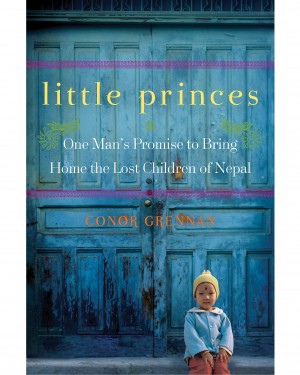 How often do you get to meet your favorite authors? Not that often, am I right! Luckily Conor Grennan, bestselling author of Little Princes, took some time off from his book tour to join us today on Facebook, for a quick chat.
How often do you get to meet your favorite authors? Not that often, am I right! Luckily Conor Grennan, bestselling author of Little Princes, took some time off from his book tour to join us today on Facebook, for a quick chat.
If you haven’t picked up a copy of Little Princes yet, you’re going to want to after hearing all about Conor’s adventures. Read on for more about coming face to face with a child trafficker, dealing with dysentery, and the joys of eating an apple.

